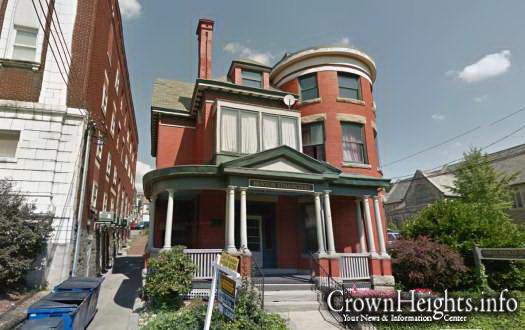
Chabad of West Virginia Purchases Historic Property
For the last six years, the living room in the small, Morgantown, W. Va., home of Rabbi Zalman Gurevitz and his wife, Hindy, has been packed with up to 35 guests each Friday night.
Mostly students from West Virginia University, the Gurevitz’s guests make the 12-minute walk from campus to Chabad of Morgantown, across Decker’s Creek in a neighborhood called South Park.
But once they are there, they are treated to a home-cooked Shabbat dinner, including freshly baked challah, a traditional kabbalat Shabbat service, and the camaraderie of being with other Jews.
With hundreds of Jewish students on campus, though, the Gurevitzes know they are reaching only a fraction of the population that they are there to serve.
They are hoping things will change next fall when the move into a new, larger facility located closer to campus, which they are currently under contract to purchase for $1.2 million.
It is the first time in over 50 years that a Jewish organization in West Virginia has purchased a new property, according to Zalman Gurevitz.
“We grew out of our house,” he said, adding that Chabad of Morgantown is a resource not only for the students and faculty of WVU, but for the 200 Jewish families that live in Morgantown.
The new facility will be funded in part by the Rohr Family Foundation, and will be called the Rohr Jewish Center.
The closing for the property is set for February. Renovations, including a new, commercial kitchen will begin this summer, and the center is slated to open in the fall of 2014.
The new center at 221 Willey St. — a main thoroughfare between the downtown WVU campus and downtown Morgantown — is positioned to attract more visitors, Gurevitz said.
“Right now, we’re about a 12-minute walk from campus,” he said. “Girls can be afraid to walk there alone at night, and most people don’t pass by our current location.”
But the new location, which will be passed each day by thousands of students, will increase visibility and awareness of Chabad, he said.
While the exact number of Jewish students at WVU is not known (the university is prohibited from asking students about their religious affiliation) they apparently comprise a small percentage of the total student population of the university.
“Our biggest challenge is to get the word out because most Jewish students [at WVU] don’t have Jewish friends,” Gurevitz said. “The new center will be closer to campus for many students than their dorm. I think our numbers will double.”
The new property, a mansion built around 1900 in the Queen Anne Revival style, is listed as a landmark on Morgantown’s historic registry.
The first floor of the building will be designated as the student center, and the Gurevitzes and their children will reside upstairs.
Gurevitz plans to build a mikvah in the basement of the building, and renovate several rooms upstairs to provide housing for Jewish students wishing to live in kosher, “faith-based housing,” he said.
“The goal of this building is to build a home away from home for Jewish students,” he said. “Jewish students should feel welcome here 24/7. It should be a place where they can come and celebrate being Jewish.”
While the center is partially funded by the Rohr foundation, Gurevitz is launching a fundraising campaign to cover additional expenses associated with the purchase of the property and its renovation.
“My plan is to raise $175,000 to $200,000 from alumni, parents and people that hold West Virginia dear to their hearts,” Gurevitz said.
The new Chabad center is one piece of a calculated effort to make WVU more appealing to Jewish students, according to Jim Ebel, an assistant professor in integrated marketing communications at the school, who has been working with WVU administration officials in increasing awareness of the Jewish presence on campus.
The new Jewish center “signifies a large commitment by Chabad,” he said.
“I’ve heard on numerous occasions that you really need to have a Jewish presence to have a great university,” Ebel said. “Jewish students are good students. There are some plans in place to do some recruiting events [targeting Jewish students]. We want to make it a more welcoming university. Chabad and other organizations can facilitate making it a more welcoming experience.”
The purchase of the new facility should help in eventually increasing the number of Jewish students at WVU, according to Ebel.
“I’m excited,” Ebel said. “I’ve been in marketing for over 30 years. It takes time for anything to happen. But over the long run, it will be beneficial to WVU and attract more Jewish students to the university.”
Chabad of Morgantown falls under the auspices of the Lubavitch Center of Pittsburgh, under the direction of Rabbi Yisroel Rosenfeld. It was Rosenfeld who assigned the Gurevitzes to Morgantown six years ago.
“This is a tremendous milestone,” Rosenfeld said. “Now it will be so much easier for them to accomplish what they want to accomplish. It just shows that even in a place like that, there is a chance for growth, and always room for improvement. We’re very proud of their accomplishments.”
For Ebel, the new center will provide a home for Jewish students, regardless of their denominational backgrounds, thanks to the warmth of the Gurevitzes.
“It’s been a long time coming,” Ebel said of the new center. “But Zalman is an amazing guy. He connects with the students well, and he connects with the community well, and he gets things done. I’m not Orthodox, but the Chabad group has always been super welcoming. The kids really like them.”











Milhouse
Mazel tov Shneur Zalmen & Hindy! Go from strength to strength with the Rebbe’s kochos.